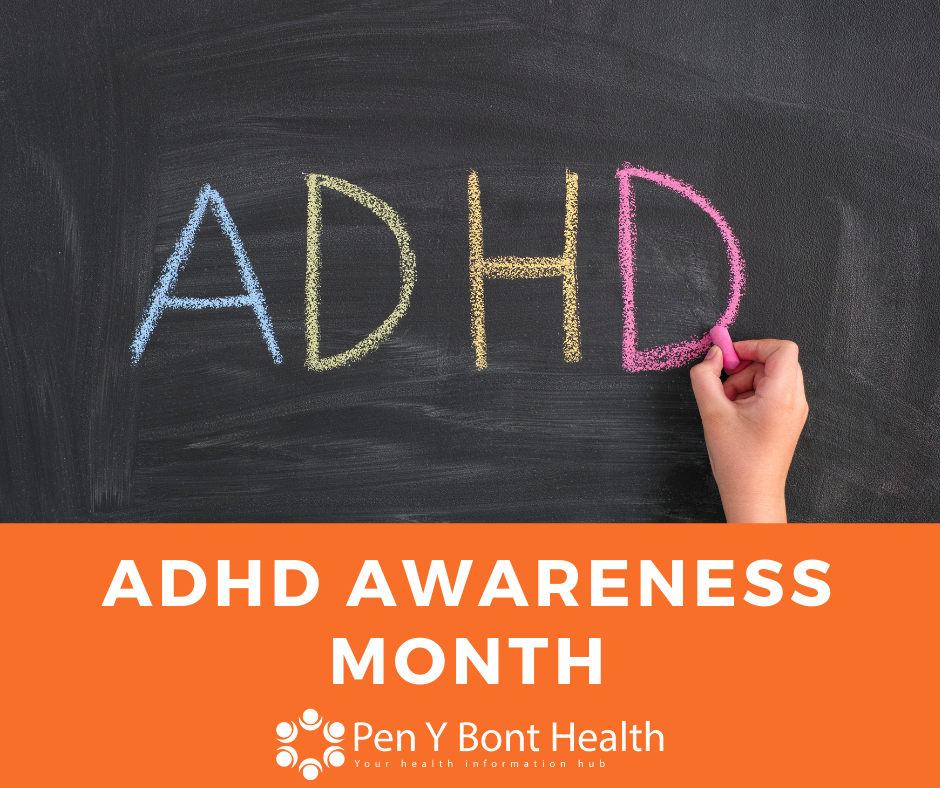
ADHD (Attention Deficit Hyperactivity Disorder) is a very common disorder which affects children and adults. October is ADHD awareness month and is an opportunity to promote awareness and raise the profile of the disorder across Wales and the rest of the UK.
What is ADHD?
ADHD is a condition where someone has lots of energy but difficulty concentrating. People with ADHD may also find it difficult to control want your say and do. For example, they may do things impulsively and speak without thinking first. Symptoms of the condition usually start very early in life, often before the age of 6.
Unfortunately, we do not know what exactly causes someone to have ADHD. However, there is some research to suggest that is runs in families and could be to do with how the chemicals in your brain work. People can also start to experience ADHD if they have overcome a difficult experience.
Supporting a child with adhd
Around 1 in 3 people who are diagnosed with ADHD as a child will grow out of the condition and will not require treatment as adults.
Those who do receive treatment tailored to their needs will often see benefits in their learning, friendships, and employability, as they understand how best to cope and adapt.
ADHD can only be diagnosed by a specialist (child psychiatrist or paediatrician) after an assessment. The assessment involves monitoring and observing a child’s behaviour at home and school. It can sometimes include using computerised tests.
If your child is diagnosed with ADHD, the observations made by specialists help in creating a support plan that aims to ensure your child can achieve their full potential. So, how can you help your child?
Go to your child’s GP or school
Your child’s GP and school will be able to support you and your child. They will help you in getting a diagnosis, something which is often needed to see improvement.
Address ADHD with your family
It is important that all family members are aware of what is going on as this can help normalise it. Try your best to keep a balance of attention on other family members and not just on your child.
Avoid
Try to help others avoid giving your child the bad reputation because of their actions. Remember, they do not know what they are doing wrong.
Boundaries
Although it may be difficult, maintain boundaries around behaviour that isn’t acceptable. Follow through on consequences.
Healthy lifestyle
All children, not just those with ADHD, need a healthy lifestyle. Help in making sure your child has a balanced diet, regular exercise, and consistent sleep routines.
Simple instructions
Breaking things down for your child may help them. If you can make tasks smaller and simpler for them, they are more likely to understand. Try to get close to them, crouch down to their height, look directly at them and talk calmly and slowly.
Don’t forget to praise
Although you must be careful not to overpraise; praise your child when they have done what you asked them to, however small it may be.
Write helpful lists
Writing helpful lists for your child and those around you can act a reminder for your child to do certain things and for others to remember what is being asked of them.
Support groups
Finding local support groups can really help you as a parent and your child. Some children with ADHD may not want to socialise with others. However, some may enjoy being around others who have the same energy levels as them. ADHD Connections are a support group for families affected with ADHD, click here to join the Facebook group for Bridgend parents.
Break activities down into manageable chunks
There are many sit-down times that are necessary when you are a child such as meals and homework. If you break down these sessions into small chunks of 15-20 minutes your child is more likely to complete them.
Avoid food additives and colourings
There is research and evidence to suggest that children with ADHD are partially sensitive to these. You can discuss this further with your GP or dietician if you are unsure.
Treatment for ADHD can help relieve the symptoms and reduce the day-to-day struggles. ADHD can be treated using medicine or therapy, but a combination of both is often recommended. If you want to talk through the treatments for ADHD then you can talk to your GP or read more about the condition here.
